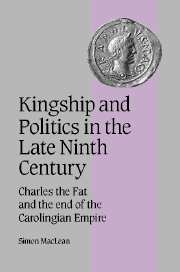 Kingship and Politics in the Late Ninth Century
Kingship and Politics in the Late Ninth Century Book contents
- Frontmatter
- Contents
- List of maps and figures
- Acknowledgements
- List of abbreviations
- Note on names, terminology and citations
- Outline chronology
- Figure 1 The Carolingian family
- Map 1 The late Carolingian empire
- 1 INTRODUCTION
- 2 UN-FRANKISH ACTIVITIES: CHARLES THE FAT IN THE EYES OF CONTEMPORARY ANNALISTS
- 3 THE MEN WHO WOULD BE KINGS: THE ‘SUPERMAGNATES’ AND THE ‘RISE OF THE ARISTOCRACY’
- 4 ROYAL POLITICS AND REGIONAL POWER IN THE LATE CAROLINGIAN EMPIRE
- 5 THE END OF THE EMPIRE I: POLITICS AND IDEOLOGY AT THE EAST FRANKISH COURT
- 6 THE END OF THE EMPIRE II: RESPONSE AND FAILURE
- 7 HISTORY, POLITICS AND THE END OF THE EMPIRE IN NOTKER'S DEEDS OF CHARLEMAGNE
- 8 CONCLUSION
- Bibliography
- Index
- Cambridge Studies in Medieval Life and Thought Fourth Series
3 - THE MEN WHO WOULD BE KINGS: THE ‘SUPERMAGNATES’ AND THE ‘RISE OF THE ARISTOCRACY’
Published online by Cambridge University Press: 15 July 2009
- Frontmatter
- Contents
- List of maps and figures
- Acknowledgements
- List of abbreviations
- Note on names, terminology and citations
- Outline chronology
- Figure 1 The Carolingian family
- Map 1 The late Carolingian empire
- 1 INTRODUCTION
- 2 UN-FRANKISH ACTIVITIES: CHARLES THE FAT IN THE EYES OF CONTEMPORARY ANNALISTS
- 3 THE MEN WHO WOULD BE KINGS: THE ‘SUPERMAGNATES’ AND THE ‘RISE OF THE ARISTOCRACY’
- 4 ROYAL POLITICS AND REGIONAL POWER IN THE LATE CAROLINGIAN EMPIRE
- 5 THE END OF THE EMPIRE I: POLITICS AND IDEOLOGY AT THE EAST FRANKISH COURT
- 6 THE END OF THE EMPIRE II: RESPONSE AND FAILURE
- 7 HISTORY, POLITICS AND THE END OF THE EMPIRE IN NOTKER'S DEEDS OF CHARLEMAGNE
- 8 CONCLUSION
- Bibliography
- Index
- Cambridge Studies in Medieval Life and Thought Fourth Series
Summary
In the year 880, the four surviving Carolingian rulers met at Vienne to draw a line under the revolt of Boso and to seal a succession and division treaty which led to a period of renewed concord in the royal dynasty. One of their more specific goals was to make kingship more accessible to the nobility of Lotharingia, the symbolically and strategically important central Frankish realm which had been thrown into renewed turmoil by the events of 879. In this aim, the Vienne treaty was broadly similar to most other Carolingian family settlements. The point of subkingship, for example, was not only to keep junior members of the royal house happy by allowing them a tangible share in power, but also to give provincial aristocracies their ‘own’ king, who would often be married into a local family of note. A nearby royal court was less a hindrance than a potential source of opportunity for regional aristocrats, serving as a source of offices which would help them entrench their local standing, and as a doorway leading onto the grander stage of imperial politics. Equally, the Carolingians, lacking the institutions of the decayed Roman state, needed members of the aristocracy, whose power was rooted in control of land, to act as the means of transposing their authority from the palace to the localities.
- Type
- Chapter
- Information
- Kingship and Politics in the Late Ninth CenturyCharles the Fat and the End of the Carolingian Empire, pp. 48 - 80Publisher: Cambridge University PressPrint publication year: 2003


